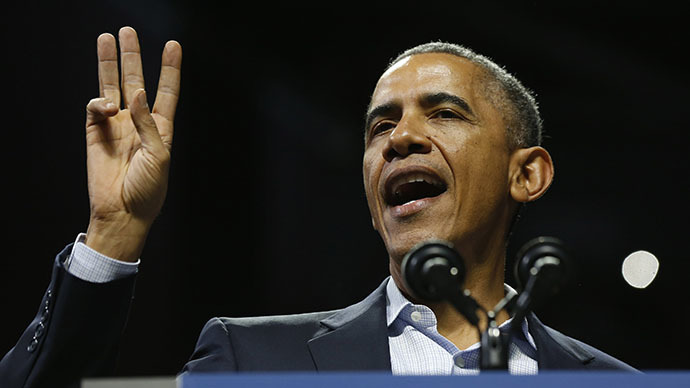Obama expected to lead Dems into biggest Senate defeat in modern history

There are more than 500 contests slated to occur from coast-to-coast this Election Day, but Americans are by and large not watching the individual races, but rather which party will prevail with regards to winning the Senate
The results of Tuesday’s midterm elections will indeed impact the political landscape on a local level, with Senate, House and gubernatorial contests occurring nationwide. Towards the tail end of a tumultuous year for the Obama administration, however, the president’s own Democratic Party is expected to bear the brunt of dismay otherwise directed at the White House and, as a result, likely lose control of Congress’ upper chamber.
On the eve of Election Day, pollsters at Gallup ranked United States President Barack Obama’s approval rating at a dismal 41 percent, and concerns over how his office has handled the crises concerning Ebola, immigration and the so-called Islamic State, among other issues, has without a doubt proved to so far be costly to the Democratic Party. As a result, onlookers to Tuesday’s elections say the left may lose control of the US Senate for the first time since 2007, which in turn would leave a Republican majority in that chamber as well as the House of Representatives.
FiveThirtyEight, the recently launched news site created by political analyst Nate Silver, said Tuesday that a review of hundreds of opinions polls and historical and demographic details suggest that the GOP has a 76.2 percent chance of winning enough Senate races to gain a majority in the chamber, whereas the Democrats currently controlling that part of the legislative branch likely only have a 23.8 percent chance of staying in charge.
“In all, there are 13 states where Senate seats might change from one party to the other,” the Washington Post reported this week in breaking down this year’s big races. “Republicans need to win nine of them to attain a 51-seat majority in the Senate for the first time since 2007. On Monday, Republicans seemed to be leading, by a lot or by a little, in eight of those races.”
“If the GOP wins all eight, they will need just one more win — one of the tossup races in Alaska and Kansas, or perhaps the runoff race that’s expected in Louisiana,” David A. Fahrenthold, Katie Zezima and Paul Kane wrote for the Post.
According to the New York Times, Alaska, Kansas and Louisiana are among the eight most competitive races occurring this Election Day. Kansas Democrats have no chance of secure a spot in that state, however, since the heated race there involves a longtime Republican incumbent going up against a businessman running as an Independent. Meanwhile, the highly anticipated results of the Senate race in Alaska will come after a campaign season that generated $39 million in outside spending, the likes of which could sway at most a half-million votes, according to the Los Angeles Times.
Further south, eyes from across America will narrow in on Kentucky, where the results of the Senate race there will directly impact leadership in Congress. Silver’s FiveThirtyEight expects that Sen. Mitch McConnell, a Republican, will overwhelmingly win re-election on Tuesday and, should that prediction come true, then the longtime lawmaker will be poised to become Senate majority leader as long as the GOP also gains control of the chamber.
Sen. McConnell casts vote as man behind him gives thumbs down at @bellarmineU. @courierjournal@ALTONPHOTO#kysenpic.twitter.com/EFAqxMfbMd
— Michael Clevenger (@MClevenger_CJ) November 4, 2014
And while the ballots being cast on Tuesday will very likely cause a sea change in Congress, former pollster Scott Rasmussen wrote for Newsmax that the significance may surpass anything seen during the last few decades. In a column last week, Rasmussen wrote that the number of Democrats in the House has shrunk from 257 to 199 since Pres. Obama took office in 2008. Should expectations be met with regards to Tuesday’s Senate races, then the 59 seats held there by the Democrats at the start of Obama’s first term could be cut down to 45, if his estimates are correct.
“To put that number in perspective, the 58 seats [in the House] already lost by the current president even tops the 46 lost by Richard Nixon amidst the Watergate scandal,” Rasmussen wrote. Pres. Nixon also saw his party lost six seats in the Senate while in office, and Obama may experience cuts in that chamber as costly as 14 seats.
At the DC-based publication Roll Call, reporter Steven Dennis wrote “Obama could set a modern record for midterm-election losses dating back to President Harry S. Truman,” the two-term president who saw the previously Democrat-controlled House lose 54 seats on his watch in the aftermath of World War Two.














